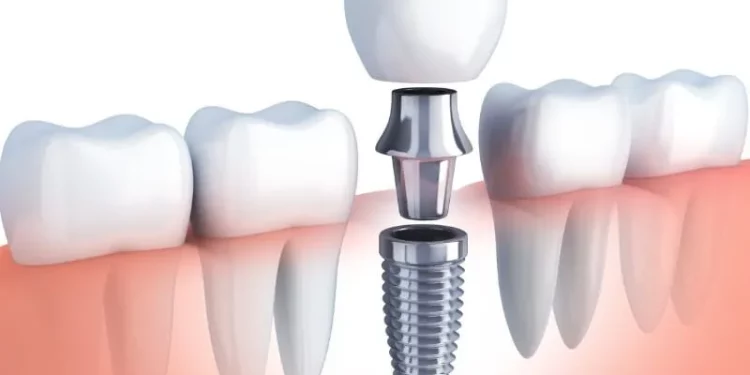Understanding Dental Implants: A Brief Overview
Dental implants are a common and effective solution for replacing missing teeth. They consist of three parts: the implant, abutment, and crown. The implant is a titanium post that is surgically placed into the jawbone to act as an artificial tooth root. The abutment connects the implant to the crown, which is the visible part of the tooth that resembles a natural tooth.
Dental implants are a popular choice for tooth replacement because they provide a long-term solution that is both functional and aesthetically pleasing. They also help maintain the structure of the jawbone by preventing bone loss, which can occur when teeth are missing.
The Impact of Missing Teeth on Speech and Eating
Missing teeth can have a significant impact on speech and eating. When teeth are missing, it can be difficult to properly pronounce certain sounds and words, leading to speech impediments. This can affect a person’s confidence and ability to communicate effectively. The teeth have this connection to speech because they play a crucial role in the formation of certain sounds, such as “t,” “d,” “s,” and “v.”
Eating can also become challenging with missing teeth as chewing becomes less efficient. This can lead to difficulty in digesting food properly, which in turn can impact overall health and nutrition. Without some teeth, it can also be challenging to bite and chew certain types of food, leading to a limited diet.
Another impact worth mentioning is the psychological impact of missing teeth. Many people feel self-conscious and embarrassed about their appearance when they have missing teeth. This can lead to a decrease in self-esteem and social anxiety.
Dental Implants and Speech
One of the main concerns with dental implants is their impact on speech. The placement of the implant in the jawbone may affect the movement and positioning of the tongue, which can alter speech patterns. However, this is typically a temporary issue as the tongue adjusts to the presence of the implant.
In some cases, patients may experience difficulty with certain sounds or words after receiving dental implants, but this can be addressed through speech therapy or minor adjustments to the implant. This solution is definitely worth it considering the long-term benefits of dental implants.
Overall, the benefits of having a stable and secure tooth replacement with dental implants outweigh any temporary speech changes that may occur.
The Positive Effects of Dental Implants on Eating Habits
Who is a good candidate for dental implants? The one with missing teeth and desire to restore eating and speech makes one a good candidate for implants.
Dental implants have a positive impact on eating habits by providing a strong and stable foundation for chewing. Unlike other tooth replacement options, such as dentures, dental implants mimic the natural structure of teeth and allow for better chewing efficiency.
This leads to improved digestion and overall nutrition as patients are able to enjoy a wider variety of foods without restrictions. It should be noted, however, that a soft food diet may be recommended during the healing process after implant surgery. Addressing Common Concerns: The Impact of Dental Implants on Speech and Eating
It’s understandable that individuals may have concerns about the impact of dental implants on speech and eating. However, it’s important to note that any changes or difficulties are usually temporary and can be addressed with proper care and adjustments.
Additionally, the long-term benefits of dental implants far outweigh any short-term challenges. They provide a natural-looking and functional solution for missing teeth, improving overall quality of life.
So, if you are considering dental implants as a tooth replacement option, rest assured that they can positively impact your speech and eating habits, while also preserving the health of your jawbone. Make sure to consult with a qualified dentist to determine if dental implants are the right choice for you. So go ahead and enjoy all your favorite foods without worry!
The Transition Period: Adapting to Speech and Eating with Dental Implants
There is a transition period when getting dental implants. During this time, patients may experience some difficulties with speech and eating as their mouth and tongue adjust to the presence of the implant.
It’s recommended to start with soft foods and gradually introduce harder textures as you become more comfortable with your dental implants. This will help ease any discomfort and allow for a smoother transition to eating with dental implants.
Additionally, practicing speaking and enunciating clearly can also help with any temporary speech changes. This is especially important for individuals who rely on clear communication for their profession or daily interactions.
Case Study: Improved Quality of Life Through Dental Implants
To understand the impact of dental implants on speech and eating, let’s consider a case study. Sarah is a 45-year-old woman who has been missing three teeth in her lower jaw for several years. She has been struggling with difficulties in chewing and pronouncing certain words.
After consulting with her dentist, Sarah decides to get dental implants to replace her missing teeth. After a few months of healing and adjustments, she notices a significant improvement in her speech and eating habits.
Sarah is now able to confidently speak without any speech impediments and enjoys a wider variety of foods without restriction. She also feels more confident in her smile, which has had a positive impact on her overall quality of life.


 Home
Home









